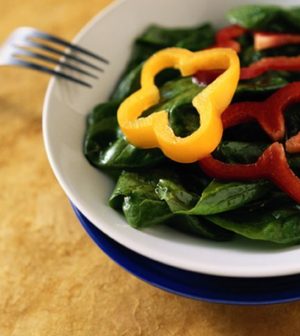- Recognizing the Signs of Hypothyroidism
- 10 Strategies to Overcome Insomnia
- Could Artificial Sweeteners Be Aging the Brain Faster?
- Techniques for Soothing Your Nervous System
- Does the Water in Your House Smell Funny? Here’s Why
- Can a Daily Dose of Apple Cider Vinegar Actually Aid Weight Loss?
- 6 Health Beverages That Can Actually Spike Your Blood Sugar
- Treatment Options for Social Anxiety Disorder
- Understanding the Connection Between Anxiety and Depression
- How Daily Prunes Can Influence Cholesterol and Inflammation
Diet Change Cured One Woman’s Rare Leg Ulcers

For people who have livedoid vasculopathy, which causes painful ulcers on the feet and lower legs, new research may bring newfound hope.
The disease is a rare medical mystery with no known cause and no commonly accepted cure, according to researchers who outlined the case of a single patient whose condition seems to have been relieved by a whole-foods, plant-based diet. The findings were published Feb. 23 in the journal BMJ Case Reports.
The woman’s symptoms started in 2006, but she only received the diagnosis of livedoid vasculopathy in 2013 after a skin biopsy. Three years later, she was prescribed antibiotics for an infected ulcer on her lower left leg.
She described having swollen feet and sporadically itching red blotches on her lower legs and feet, which would develop into painful oozing ulcers, varying in size from 1 millimeter to more than 10 millimeters. She told doctors that she would have ulcer outbreaks every few weeks to months for several years, sometimes after a minor injury or when clothes rubbed her legs.
Compression socks helped reduce the problem, but one day of not wearing them would make more ulcers appear.
She was “willing to try anything,” according to a journal news release, and her doctor suggested a whole-foods, plant-based diet because it promotes blood vessel health and has no harmful side effects. Poor blood flow is often associated with the condition, which can last for months to years.
Her diet included all vegetables, fruits, legumes, grains, herbs and spices, but limited intake of high-fat plant foods like avocado and coconut, and no meat, dairy, eggs, fried or heavily processed foods, or refined oils.
Her ulcers were healing a month later, and she described her symptoms as less bothersome than they had been in years. A year after starting the diet, her symptoms had cleared completely for the first time in eight years, according to the report.
The ulcers have only recurred when she has strayed from the diet, the researchers said. Minor lapses resulted in less painful and irritating ulcers than she previously had. By 2018, the patient had been completely free of symptoms for 18 months and felt she had “a new lease on life.” In 2019, she began eating other foods and immediately developed painful sores that required antibiotics.
The study authors, who include Morgen Smith of the Plant-Based New Zealand Health Trust, in Gisborne, New Zealand, cautioned that this is only a single case. Livedoid vasculopathy symptoms can clear by themselves.
But the woman’s case and the recurrence of symptoms when failing to stick to the diet suggest it may be linked to dietary intake, Smith and colleagues said. They suggested that foods high in fat, salt and sugar can damage the cells lining the arteries as one possible reason for these results.
The condition affects 1 in 100,000 people, mostly women in their 30s. The ulcers can leave visible scars.
More information
The Genetic and Rare Diseases Information Center has more on livedoid vasculopathy.
SOURCE: BMJ Case Reports, news release, Feb. 23, 2021
Source: HealthDay
Copyright © 2026 HealthDay. All rights reserved.










